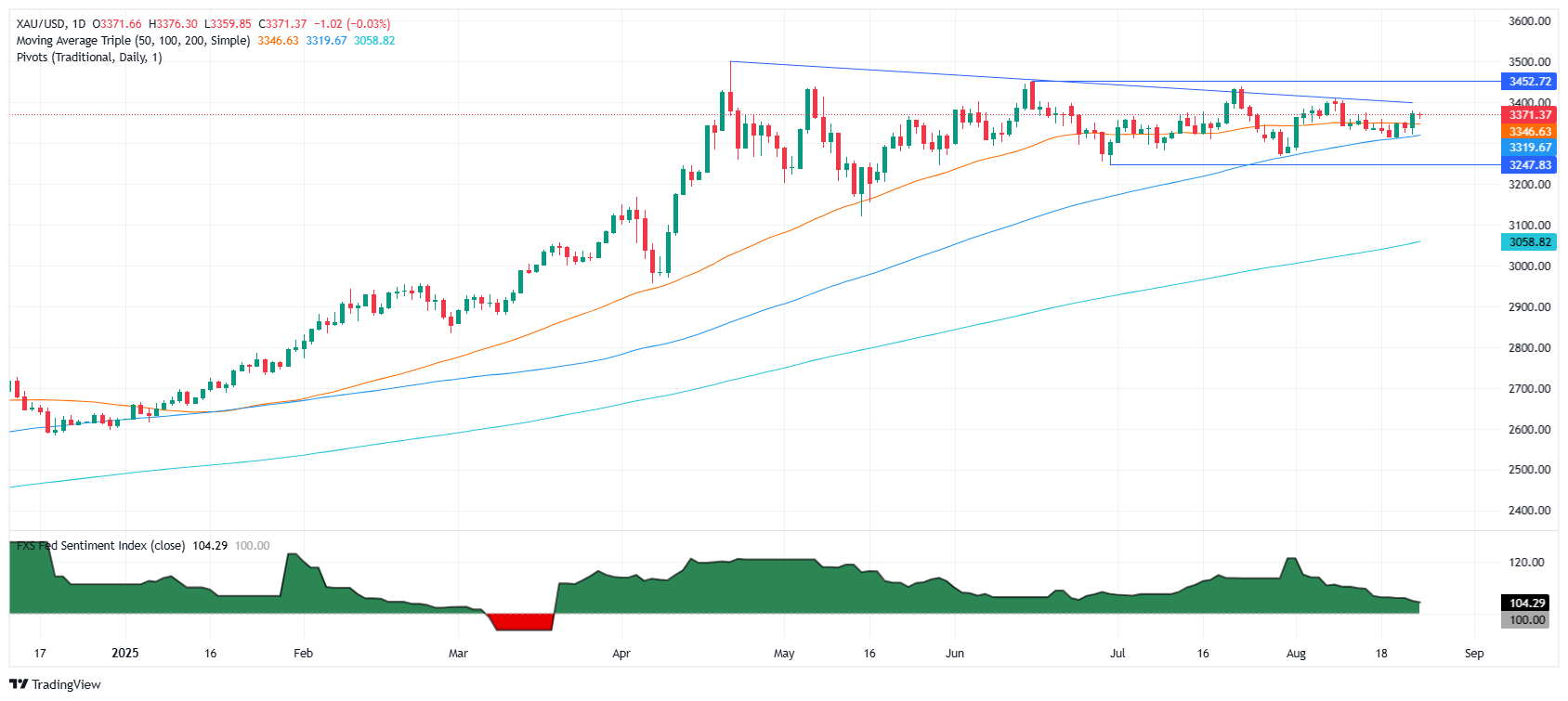Gold steady near $3,370 as Fed bets intensify

- Gold consolidates as investors price a 90% chance of September Fed rate cut, per Prime Market Terminal.
- Analysts at ING say Powell’s dovish tilt could drive Bullion toward another record high if bets materialize.
- Traders eye Durable Goods, GDP, Jobless Claims, and Core PCE for guidance on Fed’s next policy move.
Gold price holds firm at around $3,370 on Monday as the Greenback recovers some ground following Federal Reserve (Fed) Chair Jerome Powell's dovish tilt last Friday. A scarce economic docket on Monday, except for New Home Sales, keeps traders focused on labor market data and the Fed’s preferred inflation gauge, the Core Personal Consumption Expenditures (PCE) Price Index.
The non-yielding metal lacks direction, with traders seeming to be booking profits following Powell’s stance. Alongside the data mentioned above, Gross Domestic Product (GDP) figures will also be crucial in suggesting if the Fed should keep rates at the 4.25%-4.50% range or reduce rates based on a slowdown.
Despite this, investors had priced in a 90% chance of a rate cut, as revealed by the Prime Market Terminal interest rate probability tool.
ING analysts, on a note, write, “Traders added to bets the Fed will cut rates next month. With US rate cut bets intensifying after Powell’s speech, Gold could be poised for another fresh record high.”
In the meantime, US President Donald Trump and Russian President Vladimir Putin talked about denuclearization and Trump added that Putin is reluctant to meet Zelenskiy because he does not like him.
A de-escalation of the Russia–Ukraine conflict would be negative for Bullion prices, which usually fares well amid geopolitical uncertainty.
In the meantime, CNBC reported that furniture tariffs will be imposed as part of a national security investigation into lumber, citing a White House official.
Ahead this week, Gold traders will eye the release of Durable Goods Orders, GDP, Initial Jobless Claims, and the Fed’s favorite inflation gauge, the Core Personal Consumption Expenditures (PCE).
Daily digest market movers: Gold price holds firm amid elevated US yields
- US Treasury yields are rising, with the 10-year Treasury note climbing one and a half basis points to 4.269%. US real yields — which are calculated from the nominal yield minus inflation expectations — are up one and a half bps at 1.86% at the time of writing.
- The US Dollar Index (DXY), which tracks the performance of the buck against a basket of six currencies, gains over 0.52% to 98.24.
- Last Friday, Fed Chair Powell said, “The baseline outlook and the shifting balance of risks may warrant adjusting our policy stance.” He added that “the stability of the unemployment rate and other labor market measures allows us to proceed carefully.”
- Cleveland’s Fed Beth Hammack added that the Fed is a small distance away from the neutral rate and that the “Fed needs to be cautious about any move to cut rates.” She expects a rise in inflation and in the unemployment rate.
- US New Home Sales fell -0.6% in July from 0.656 million to 0.652 million.
Technical outlook: Gold trades choppy within $3,350-$3,400
Gold price has climbed above $3,350, and it seems poised to remain within a $50 range, capped at $3,400. The Relative Strength Index (RSI) turned bullish but on Monday shifted flat, an indication of the lack of volatility.
If XAU/USD climbs past $3,400, the next resistance would be the June 16 high of $3,452, ahead of the record high of $3,500. On the flipside, the $3,300 figure would be the first demand zone.
Conversely, if Bullion tumbles below, it could halt its stop at the 20/50-day Simple Moving Average (SMA) at $3,348. On further weakness, the 100-day SMA is next at $3,312.

Gold FAQs
Gold has played a key role in human’s history as it has been widely used as a store of value and medium of exchange. Currently, apart from its shine and usage for jewelry, the precious metal is widely seen as a safe-haven asset, meaning that it is considered a good investment during turbulent times. Gold is also widely seen as a hedge against inflation and against depreciating currencies as it doesn’t rely on any specific issuer or government.
Central banks are the biggest Gold holders. In their aim to support their currencies in turbulent times, central banks tend to diversify their reserves and buy Gold to improve the perceived strength of the economy and the currency. High Gold reserves can be a source of trust for a country’s solvency. Central banks added 1,136 tonnes of Gold worth around $70 billion to their reserves in 2022, according to data from the World Gold Council. This is the highest yearly purchase since records began. Central banks from emerging economies such as China, India and Turkey are quickly increasing their Gold reserves.
Gold has an inverse correlation with the US Dollar and US Treasuries, which are both major reserve and safe-haven assets. When the Dollar depreciates, Gold tends to rise, enabling investors and central banks to diversify their assets in turbulent times. Gold is also inversely correlated with risk assets. A rally in the stock market tends to weaken Gold price, while sell-offs in riskier markets tend to favor the precious metal.
The price can move due to a wide range of factors. Geopolitical instability or fears of a deep recession can quickly make Gold price escalate due to its safe-haven status. As a yield-less asset, Gold tends to rise with lower interest rates, while higher cost of money usually weighs down on the yellow metal. Still, most moves depend on how the US Dollar (USD) behaves as the asset is priced in dollars (XAU/USD). A strong Dollar tends to keep the price of Gold controlled, whereas a weaker Dollar is likely to push Gold prices up.







